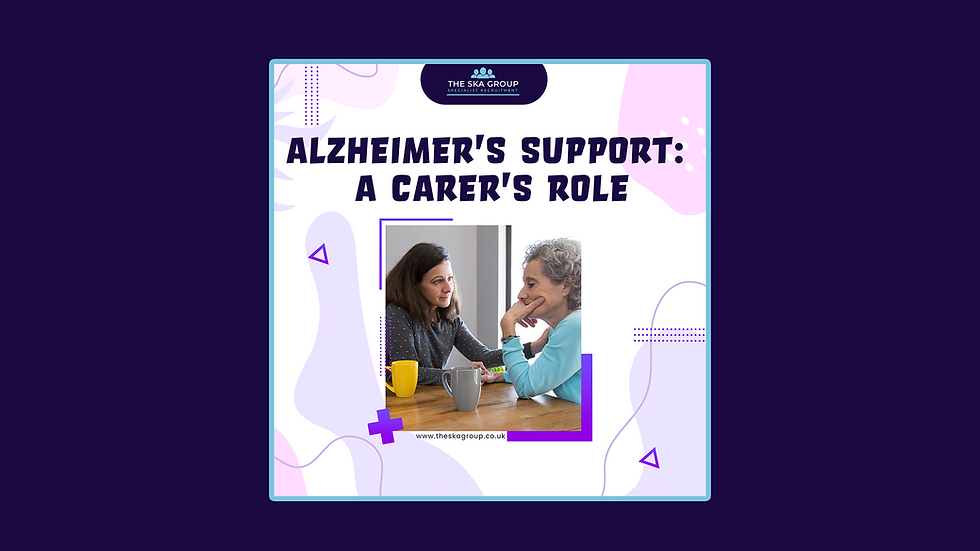Dementia: What Is It?
- Emily

- May 19, 2025
- 4 min read
Dementia is a significant health issue for our aging population, yet it is often misunderstood. As life expectancy increases, so does the risk of developing dementia. This condition goes beyond memory loss; it affects the overall quality of life for millions. This blog aims to provide a clear understanding of dementia; we will explore the symptoms and causes, as well as the most effective treatment practices available today.
What is Dementia?
Dementia refers to a group of symptoms that affect cognitive functioning, impacting memory, reasoning, and social skills to the point of interfering with daily life. It is not a specific illness but a term that encompasses various conditions. For instance, Alzheimer's disease is the most prevalent type, accounting for approximately 60-70% of all cases. Other forms include vascular dementia, caused by blood flow disruptions, Lewy body dementia, linked with abnormal protein deposits in the brain and frontotemporal dementia, which affects behavior and language, often emerging earlier in life.
Symptoms of Dementia
Early recognition of dementia symptoms is crucial for effective intervention. These symptoms can differ by type but commonly include:
Memory Loss: Often the first sign, people may forget recent events, important dates, or appointments. For instance, a person might repeatedly ask when a family member is visiting, even after having just spoken about it.
Communication Challenges: Individuals may struggle to find the right words or may frequently repeat themselves, which can hinder conversations.
Disorientation: Confusion about time, place, and even familiar faces can occur. This might manifest as a loved one wandering outside and being unable to recognize their own neighborhood.
Poor Judgment: Decision-making may become impaired, resulting in difficulties with routine tasks like managing finances or planning meals.
Mood Changes: Significant emotional shifts are common, leading to anxiety, irritability, and even depression. A once-social individual may withdraw from cherished activities, such as hobbies or family gatherings.
Recognizing these symptoms early can assist in seeking timely help and planning appropriate care.
Causes of Dementia
Dementia stems from various brain changes that can be attributed to several factors:
Neurodegenerative Diseases: Alzheimer's and Parkinson's diseases cause gradual neuron loss, leading to cognitive decline. For example, studies show that around 1 in 9 older adults are living with Alzheimer's.
Vascular Issues: Strokes and reduced blood flow to the brain can lead to vascular dementia. Research indicates that 15% of stroke survivors will develop dementia within 3-6 months.
Infections: Certain infections, such as HIV or meningitis, can cause significant cognitive issues due to inflammation and damage.
Substance Misuse: Long-term abuse, especially of alcohol, can lead to dementia-like symptoms known as alcohol-related brain damage.
Other Influencing Factors: Head injuries, metabolic disorders, and chronic illnesses like diabetes can also affect brain health and increase dementia risk.
Understanding these causes can assist in creating prevention and intervention strategies.
Treatment Practices for Dementia
Currently, there is no cure for dementia, but many treatments can help manage symptoms and improve quality of life:
Medications: Some drugs, such as cholinesterase inhibitors, can enhance memory and cognitive function in Alzheimer's patients. Research shows that about half of people with Alzheimer's benefit from these medications, experiencing slower symptom progression.
Cognitive Activities: Mental exercises, such as puzzles or memory games, can help maintain cognitive function. Studies suggest that engaging regularly in such activities can slow decline by up to 30%.
Lifestyle Adjustments: A balanced diet rich in fruits, vegetables, and whole grains, along with regular exercise and social interaction, is vital for mental and physical well-being. For instance, regions with a Mediterranean diet report a 20% lower risk of developing Alzheimer's compared to those with high-fat diets.
Supportive Care: Caregivers are essential. Programs providing education on dementia care can enhance coping strategies and improve caregiver well-being.
Palliative Options: In advanced stages, palliative care focuses on comfort and quality of life. Hospice services can provide crucial support for families.
A collaborative approach in managing treatment can empower both caregivers and individuals living with dementia.
Coping with Dementia
Finding ways to cope with the challenges of dementia, whether personally or as a caregiver, is vital:
Support Groups: Connecting with others who face similar challenges can be immensely beneficial. Sharing experiences often leads to valuable insights and emotional relief.
Continuous Education: Understanding dementia’s nuances equips families and caregivers to handle various situations more effectively. Information sessions and workshops can be helpful.
Consistency in Routines: Establishing a daily routine helps create a sense of stability and peace for both individuals affected by dementia and their caregivers.
Professional Assistance: Seeking help from healthcare providers ensures that both affected individuals and caregivers can access the resources and support they need.
With knowledge and proactive management, the impacts of dementia on daily life can be mitigated, benefiting both individuals and families alike.
Navigating the Journey with Dementia
Dementia is a complex condition that often evokes confusion and fear. By grasping its symptoms, causes, and treatment practices, individuals can approach this challenging journey with a more informed mindset. Although dementia remains a formidable diagnosis, ongoing research holds hope for future developments in care and treatment. Whether you are a caregiver or someone living with dementia, staying informed and connected is key to navigating this path with compassion and resilience.
In essence, fostering open conversations about dementia, advocating for early diagnosis, and embracing compassionate care can significantly improve the lives of those affected and their loved ones. As our understanding of dementia evolves, so too must our approach to support and manage this pressing health issue.




Comments